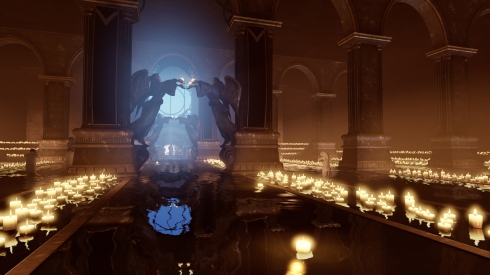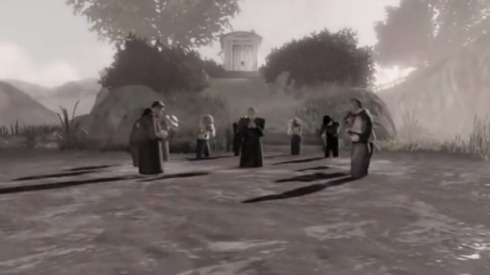Bioshock Infinite: Part One, Part Two, Part Three
WARNING: Major spoilers for Bioshock Infinite.
I promise that this will be my very last post on Bioshock Infinite. But I couldn’t stop without talking about religion, since it’s such an important and intriguing aspect of the game.
While thinking about this post, I debated for a long time about whether I thought Bioshock Infinite dealt with Christianity or religious beliefs in general or even just cults. And, after going over all the evidence in my head many times, I think it deals exclusively with Christianity.
Columbia is heavily steeped in an exaggerated American mythos. Praise of the Founding Fathers and American exceptionalism is carried past it’s logical conclusion and warped into something that’s more like idolization. And it’s all tidily wrapped up in a bow of religious fervor, which is also an exaggeration of a country that has been influenced by religion since its inception.
Columbians don’t worship Jesus — they’ve replaced him with Comstock and the Founding Fathers — but their religious devotions have all the trappings of a particularly Southern American Christian tradition. I’m guessing that Irrational Games took inspiration from mass historical movements like the Second Great Awakening, although scenes similar to the imagery in Bioshock Infinite aren’t exactly unheard of today. For example, here are old and new pictures of river baptisms. Notice the prevalence of white robes that bear a striking similarity to those worn by Comstock’s most devout.
And Zachary Hale Comstock is every inch the fire and brimstone preacher. It doesn’t hurt that the name Zachary is often taken from the Biblical character Zechariah, who is the father of John the Baptist. I won’t get too far into baptism yet, but the game might as well be called Bioshock Infinite: Get Ready for Pruny Feet Because You’ll Be Walking Through a Lot of Water in This Game.
There are also tons of references to the Bible. Comstock perverts the stories of Noah’s Ark and Sodom and Gomorrah to justify his own rather un-Christian mission (although he’s certainly not the first real or fictional character to do so), and forgiveness, a central tenet of the New Testament, is a major theme of both Comstock’s sermons and the overall game.
So I would say that the game draws heavily from a specifically American Protestant tradition, even if it’s content is not identical (hint: it’s not). But the question that I’ve posed is whether or not the game goes on to offer a critique or religion, if it is negative towards religious belief, etc.
If the only Christian content in the game were the beliefs and horribly bigoted practices of Comstock and his followers, I might be inclined to say that the game did have something negative to say about Christianity.
However, there is also the depiction of normal Christianity in Booker’s repeated flashback to his Shrodinger’s baptism. Baptim’s complete forgiveness and absolution of sins are absolutely central to the game.
And the game refuses to let us forget it. Booker’s very first interaction with Columbia is a stroll through the Baptism Welcome Center while “Will the Circle Be Unbroken?” (a well-known and popular Christian hymn) is sung in the background. Before he can enter the city, where he will eventually face his ultimate sin and seek to repair it, he has to undergo a baptism. (And there’s some birth canal imagery in the tunnel, just in case you didn’t get the “reborn” thing yet.) At this point, he’s completely resistant — and is the baptizer really wrong when he says “this one doesn’t look clean to me”? — and nearly drowns as a result.
Later, he and Elizabeth finally encounter Comstock standing next to a baptismal font. Booker is desperately trying to make up for the terrible things he’s done in life, and in doing so he murders Comstock with the baptism font. (We couldn’t get more obvious here.) If the player already knows the revelation about Comstock, this action is deeply, deliciously suffused with dramatic irony. Booker wants to prevent Elizabeth from becoming a murder (it’s a little late for that) and he wants Comstock to pay for the evil that he’s done.
And so he does what he has always done and solves his problem with violence. He bastardizes the baptism ceremony — the baptismal font fills with Comstock’s blood — and simply kills the other version of what he could have been, still leaving the “other” man who betrayed Elizabeth and unjustly murdered thousands.
Ultimately, murdering Comstock is trivial and ineffective. As Elizabeth reveals, there will be no end to the cycle until Booker accepts annihilation of all versions of himself.
The final death-by-baptism is a final, ultimate “redemption,” but it’s not necessarily Christian. Baptism is supposed to be a spiritual rebirth, but Booker just dies (depending on how you interpret the post-credits stinger).
I would call that last scene a sort of agnostic baptism. Booker can’t be so easily absolved of the terrible things that he’s done, and baptism can’t help him heal from his own wounds (obviously, since it leads to his transformation into Comstock). But he does accept his death willingly. It is the first time in the game that we see him submit to a baptism, and he does so with selfless intentions.
If there’s any sort of religious critique in the game, it’s not that Christianity or religion are unilaterally bad. I would say that the game is, at worst, skeptical. We have two potential outcomes for the main character: the cynic, Booker or the zealot, Comstock. Both characters are miserable and cause absolute disaster for everyone around them. Neither option is recommended.
Perhaps the game’s answer is that actions also need to be actively atoned for. Comstock achieves “redemption” through baptism, but he never does anything to earn that redemption. Instead, he went on to commit more crimes in the name of God. On the flip side, Booker rejects any possibility of redemption. He sees himself as a lost cause — as someone unworthy of forgiveness. Maybe it is impossible for him to atone for what he’s done, but he never tries.
I can’t even say that the game is advocating some sort of middle ground between Booker and Comstock. And, really, the game doesn’t need to choose a position. It raises an interesting question, and we can all answer it in our own ways.
Should we also be skeptical of forgiveness, especially if it is complete and unqualified? What effect does forgiveness have on other people? Typically, our unqualified metaphysical destruction doesn’t cause some sort of time ripple that erases the past. If we do something terrible, it’s been done. It’s affected other people, and we can’t change the past.
But do we still feel that forgiveness can be reached? Even if it can’t, should be still strive for it? And for who? For ourselves (similar to Comstock)? In an attempt to fix the harm we’ve done to others? Is that even possible?
I’ll follow the game’s example, and I won’t pretend to have answers. We all have to craft our own belief systems. (And hopefully there aren’t infinite, conflicting versions of each of us roaming around causing all sorts of trouble.) Since the game does not position itself as a Christian game, it approaches core Christian ideals from an un-affiliated perspective and treats them separately from their religious context. In the best scenario, this different way of seeing things can offer a fresh take on an old or taken for granted idea. Thinking about the Big Questions from others’ perspectives is healthy for both the religious and the non-religious. Examining beliefs that we take for granted can help us to change or reaffirm those beliefs.
The cultish, warped Christianity of the Columbians is certainly not endorsed by the game, and, more importantly, it’s not nearly as central to the plot and themes as the examination of the Christian ideal of forgiveness. (I am not saying that forgiveness is Christian, only that the specific type of unrestricted, absolute forgiveness used in the game comes from a Christian ideology and tradition.) There’s a difference between using the imagery and practices of Christianity to create a game world and actively critiquing real life Christianity or Christians (although I wouldn’t discount the possibility that some Christians are being criticized). Forgiveness is more authentically Biblical than praying in front of giant statues of the Founding Fathers, so I think any real critique of Christianity can be found in that portion of the game.
Bioshock Infinite isn’t perfect, but I hope everyone can appreciate it for raising so many issues that aren’t often tackled in games. And when they are, they are often dealt with tangentially. It’s exciting (for me, at least) to have a major game released that treats fluid topics with such attention and seriousness. I hope that the success of games like Bioshock Infinite helps game developers to be daring in their writing and designing, especially as we move into a new console generation.
(Let’s see if everyone read all the way down here. NO, Bioshock Infinite is not anti-Christian.)





Hey, this is a really well written article tackling many of the questions Bioshock: Infinite brings up. I just finished the game last night, and so I was pretty interested to see other people’s perspectives on this title.
It was a good game, overall, and if nothing else, I enjoy the fact it brought God into some discussions — especially concerning video games, where He is often left out. To see a AAA title hitting this close to home on the Christianity front is, if nothing else, interesting (despite what light it ultimately casts upon it).
If the most powerful and influential empire in history couldn’t shake Christ, Bioshock sure won’t. And it’s not everyday I play a major release that rocks out some good old fashion worship music.
Blessings.
You took a framing device, Christianity, at face value. The Shock games have always been about power, corruption and control. Nationalism, religion and racism were just tools to gain power and control. Power corrupts and the only thing power seeks is more of itself, i.e. Der Wille Zur Macht, the Will-To-Power.
Also, get off your Christian pedestal, forgiveness existed for many thousands of years before your religion or it’s father religion, Judaism, and still before it’s many father religions of the ancient mid east.
Just saying though, she flat our said that forgiveness was not exclusive to Christianity. The way that the game represents forgiveness however is very Christian-like (Baptisms and whatnot).